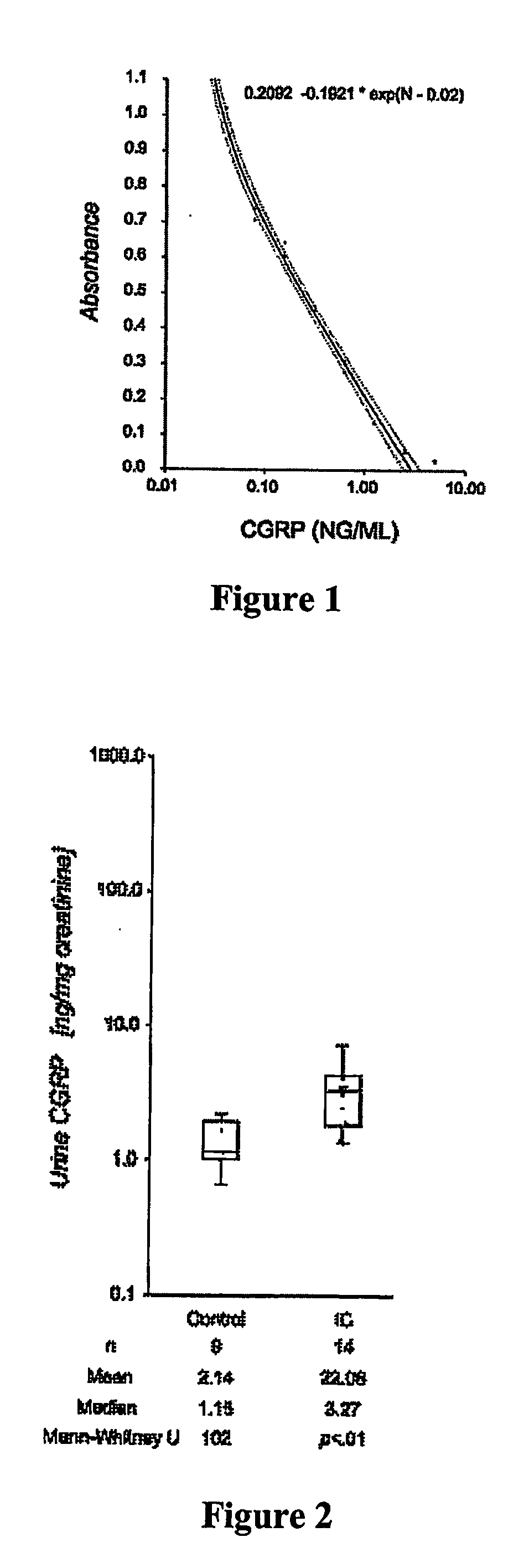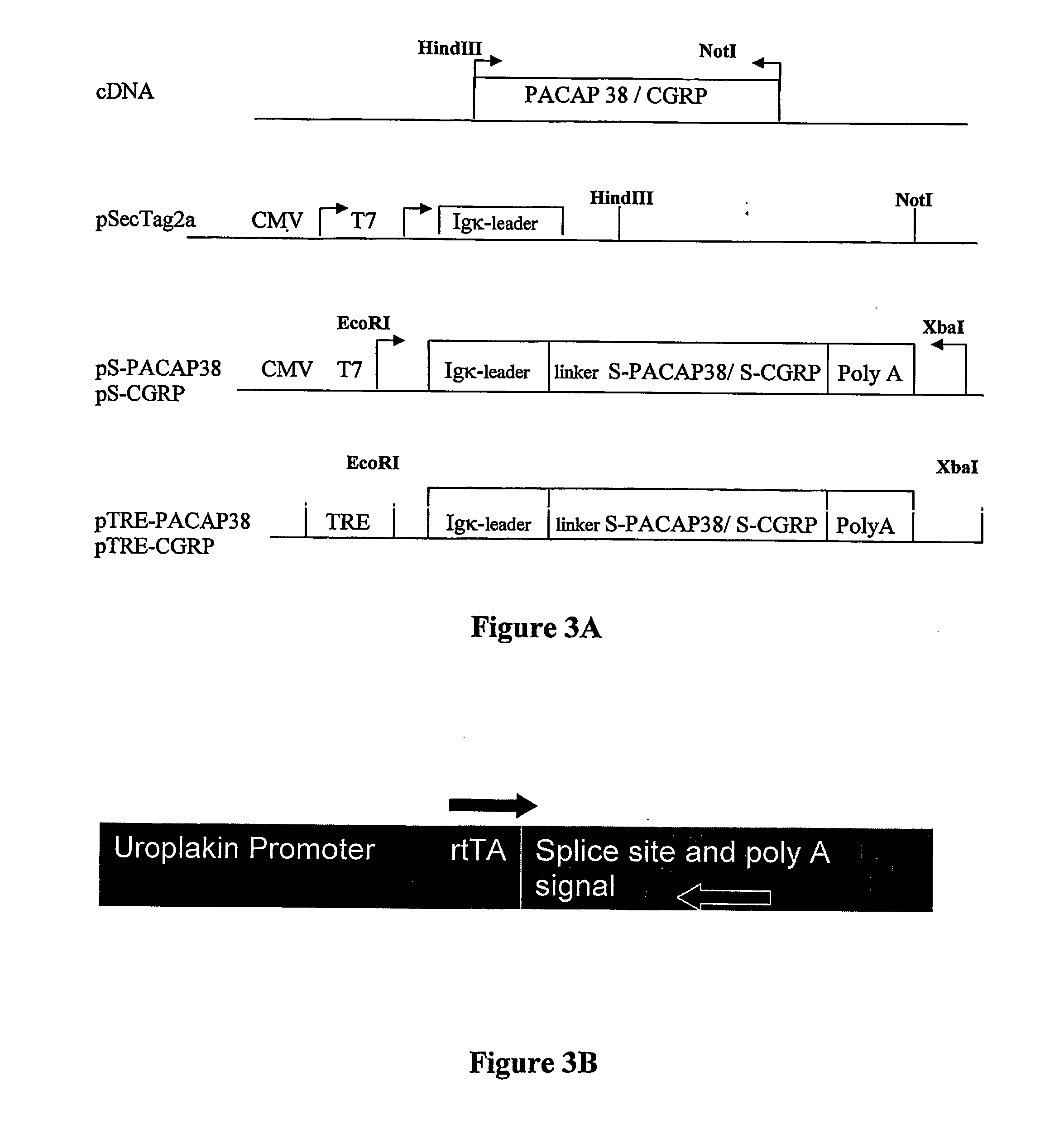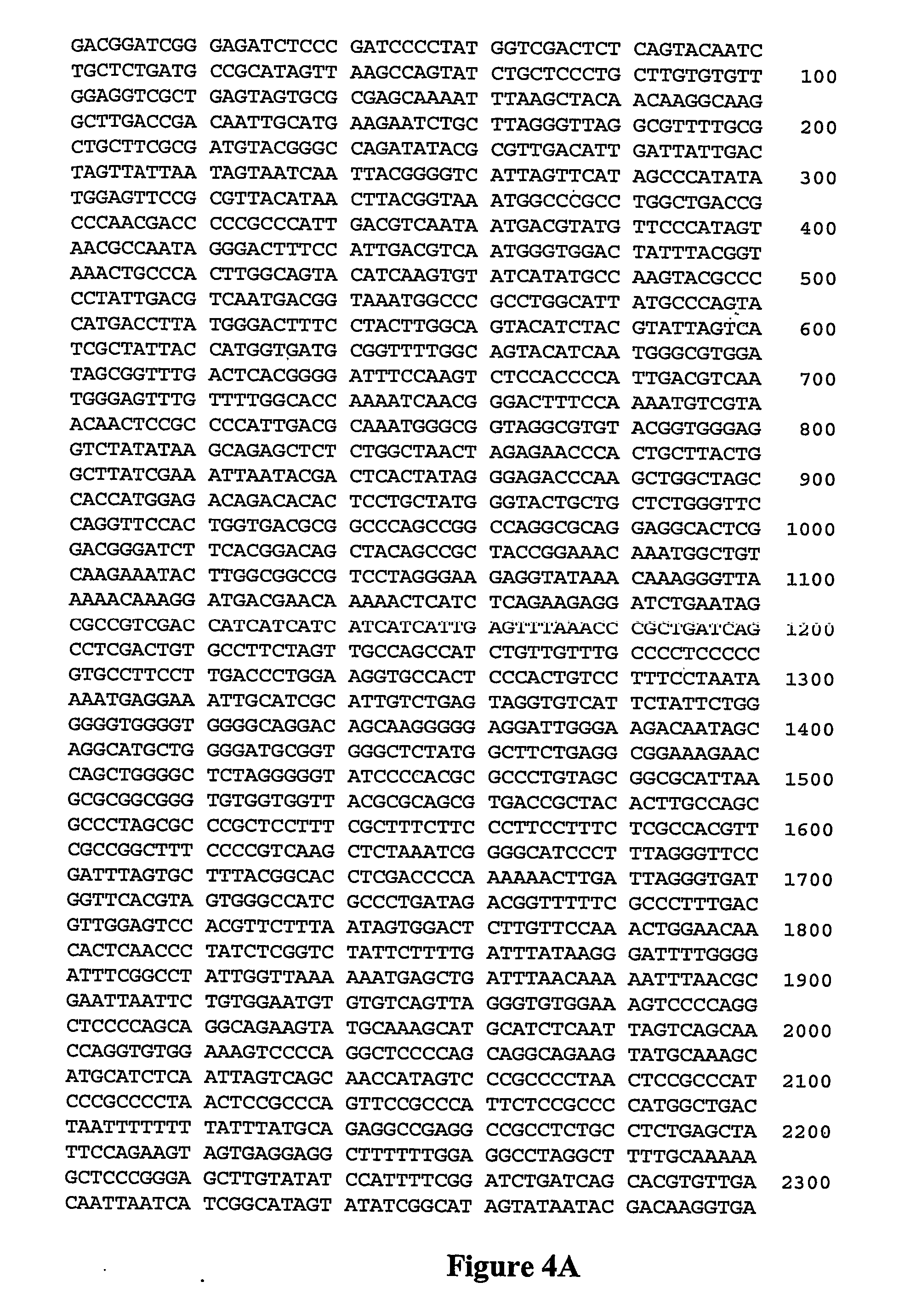Detection of neureopeptides associated with pelvic pain disorders and uses thereof
a technology of neuropeptides and pelvis, applied in the direction of hormone peptides, instruments, drug compositions, etc., can solve the problems of inconsistent bladder of patients with interstitial cystitis, no reliable correlation, and patients with various problems, so as to achieve the effect of reducing symptoms of pelvic pain disorder and effective treatment of pelvis pain disorder
- Summary
- Abstract
- Description
- Claims
- Application Information
AI Technical Summary
Benefits of technology
Problems solved by technology
Method used
Image
Examples
example 1
Enzyme-linked Immunosorbant Assay for CGRP
[0068]Urine samples were centrifuged at 2000×g for 5 min to pellet cellular debris, and then supernatants were aliquoted and stored at −70° C. prior to extraction and assay. Equal volumes of urine and 1% trifluoroacetic acid (TFA) were mixed, and then centrifuged at 6000×g for 20 minutes at 4° C. The resulting supernatant was collected for extraction. C18 Sep columns were equilibrated with 1 ml of 100% acetonitrile, and then washed three times with 3 ml 1% TFA prior to loading the prepared supernatant. After the clarified and acidified samples were loaded onto the column, the columns were once again washed with 1% TFA (3 ml, three times). Sample was eluted using 3 ml 60% acetonitrile in 1% TFA. Eluents were vacuum dried overnight, and then resuspended in the supplied assay buffer (Cat.# S-1199; Peninsula Laboratories, San Carlos, Calif.). CGRP concentrations were normalized against urine creatinine levels, as determined by calorimetric assay...
example 2
Demonstration of Elevated CGRP Excretion in Interstitial Cystitis
[0069]The ELISA according to Example 1 was used to provide a urine analysis for 9 controls and 15 patients. The medians for controls and IC patient groups were 1.21 and 3.11 ng / mg creatinine respectively. Note that 75% of the IC patients had CGRP levels greater than 1.92 ng / mg creatinine, and that 75% of control subjects had levels less than 1.82 ng / mg creatinine. The concentration estimates were evaluated with a nonparametric test: Mann-Whitney U=105, p(1,21)=6.85 p=0.0161. The demonstration of an elevation in CGRP in IC patients suggests that CGRP could have a role in the causation of or disposition to develop the disease, or may reflect a post-initiation process unique to this diagnosis. It may be causally or correlatively related to urgency, frequency, reduced bladder volume, or pain.
example 3
Preparation of UPII-rtTA Transgene and Transgenic Mice
[0070]The UPII-rtTA transgene was constructed by replacing the lacZ reporter gene in the UPII-lacZ plasmid supplied by Dr. Sun (Mol. Biol. Rep. 23(1):3-11 (1996); U.S. Pat. No. 5,824,543 Sun, each of which is hereby incorporated by reference in its entirety) with the rtTA cDNA from the pUHD172-1neo plasmid (now commercially available as Tet-On™ (BD Biosciences / Clontech). Transient transfection of MBT2 cells and induction of reporter genes with doxycycline confirmed biological activity of the transgene preparation before the investment of time and materials involved in generating transgenic mice.
[0071]The UPII-rtTA transgene was injected into 200 C57BL / 6J×DBA2 / J mouse zygotes and mice were screened for the transgene by polymerase chain reaction (PCR). Four founder mice identified. Germline transmission of the UPII-rtTA transgene has been obtained and a “best candidate” line has been bred to homozygosity. Expression of rtTA protein...
PUM
| Property | Measurement | Unit |
|---|---|---|
| Frequency | aaaaa | aaaaa |
Abstract
Description
Claims
Application Information
 Login to View More
Login to View More - R&D
- Intellectual Property
- Life Sciences
- Materials
- Tech Scout
- Unparalleled Data Quality
- Higher Quality Content
- 60% Fewer Hallucinations
Browse by: Latest US Patents, China's latest patents, Technical Efficacy Thesaurus, Application Domain, Technology Topic, Popular Technical Reports.
© 2025 PatSnap. All rights reserved.Legal|Privacy policy|Modern Slavery Act Transparency Statement|Sitemap|About US| Contact US: help@patsnap.com



